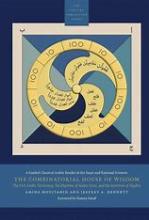By Mehari Worku
This academic year, MELC is offering third-year Arabic (ARAB 301, 302, 303). This series of courses includes classes in language acquisition, culture, and the history of the language, touching on contributions from the Golden Age of Islamic science.
Amina Moujtahid has co-authored a new book titled The Combinatorial House of Wisdom, published by Zaytuna College in the Zaytuna Curriculum Series. The book presents guided readings in Arabic by al-Khalīl and al-Khwārizmī (scientists from Baghdad in late 8th and early 9th century) as well as information about the essence of their unique combinatorial method of discovery. No other scientific writings of the age exerted a greater influence on the development of the sciences in the Arabic language and the scientific foundations of our modern world. The selections in this reader are accessible to anyone with a knowledge of Arabic at the late second-year level. No other prerequisites are needed, as al-Khwārizmī’s algebra is presented without algebraic notation, just as it was formulated. Supplementary readings demonstrate how the combinatorial method was used by other thinkers of that time in the invention of cryptology and the analysis of the rhythms of Arabic music.
Amina Moujtahid also plans to offer a five-credit study abroad program in 2025. The 2024 initial season of the study abroad in Morocco was successful and popular with students. Regarding the 2024 study abroad, Amina reflects,
“Participating in the study abroad program in Morocco was a transformative experience that blended immersive language learning with exposure to the cultural, historical, and social fabric of the Arab world. Daily classes, coupled with interactions in marketplaces, cafes, and host families, pushed students of the Arabic language outside of their comfort zone and provided them the opportunity to apply their linguistic skills in real-life situations. Over time, students grew more confident in speaking and understanding Arabic, realizing that the mix of formal and informal linguistic learning was key to meaningful progress.”
“From the bustling cities of Marrakech and Fes to the serene landscapes of the Atlas Mountains, each part of Morocco revealed its own unique identity. Living with a host family gave students insights into daily life, traditions, and the importance of community, ultimately allowing students to gain valuable cultural perspectives that cannot be replicated in the classroom. Whether by sharing a platter of couscous on Friday or visiting medieval landmarks on weekends, students actively deconstructed preconceived notions about the Arab-Muslim world and learned to value the similarities between humans of different cultures. These experiences not only enhanced students’ Arabic proficiency but also broadened their worldviews, leaving them with lasting memories and a more nuanced appreciation for the intersection of language and culture.”
